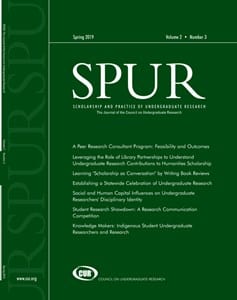SPUR (2019) 2 (3): https://doi.org/10.18833/spur/2/3/9
Student researchers are rarely trained to explain their work to a general audience but must do so throughout their careers. To assist undergraduate researchers in building this skill, the Student Research Showdown—a research video and presentation competition—was created at the University of Texas at Austin. Students create brief videos on which their peers vote, and the top video creators face off with presentations and are awarded prizes by a panel of judges. Students reflect on their experiential learning as they construct a narrative that disseminates their findings, communicates impact, and serves as a sharable testament to their success. Indirect measures indicate that students improve their research communication skills by participating in this event.
More Articles in this Issue
No posts found


